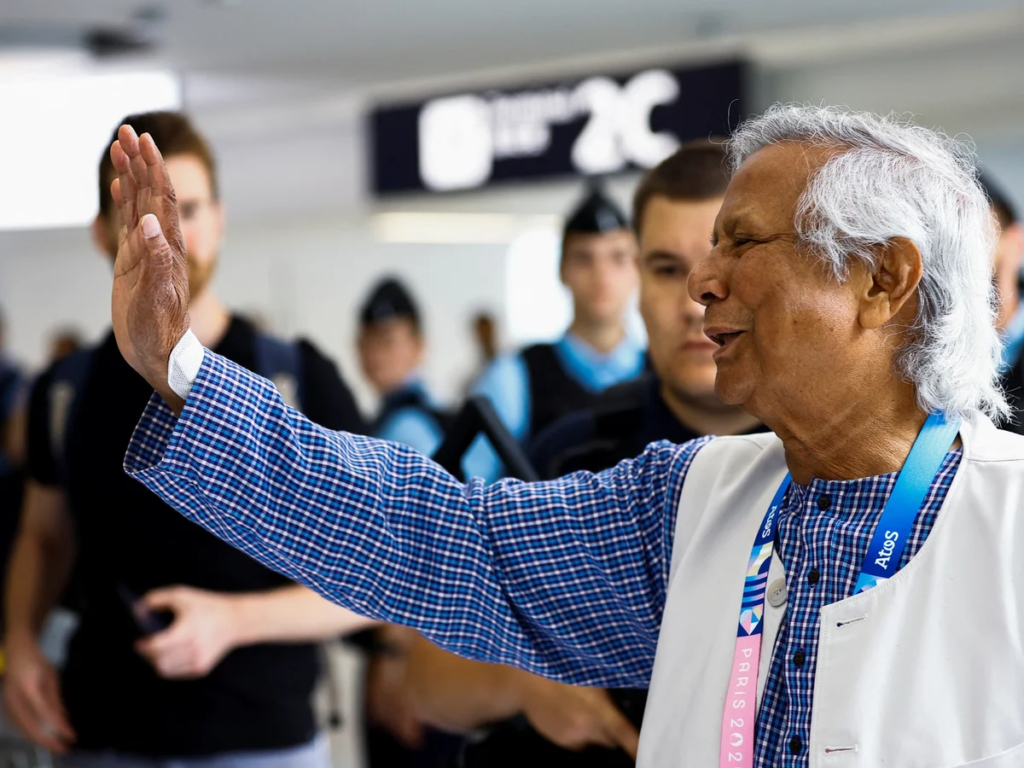In a dramatic turn of events, Muhammad Yunus, the renowned Nobel Peace Prize laureate and social entrepreneur, has returned to Bangladesh to take on a pivotal role as the head of an interim government. This significant development marks a new chapter in Bangladesh’s political landscape and has ignited widespread hope and anticipation among its citizens.

Muhammad Yunus Returns to Bangladesh to Lead Interim Government
A Return to Leadership
Muhammad Yunus, celebrated for his pioneering work in microfinance and his commitment to alleviating poverty, has come out of retirement to address the current political and economic challenges facing Bangladesh. His return to the public stage as the leader of the interim government reflects both a deep sense of responsibility and a desire to guide the nation through a crucial transitional period.

Muhammad Yunus Returns to Bangladesh to Lead Interim Government
A Legacy of Social Impact
Yunus, who was awarded the Nobel Peace Prize in 2006 alongside Grameen Bank, which he founded, has long been recognized for his innovative approach to tackling poverty through microcredit. His vision of empowering the poor through small loans and financial inclusion has transformed millions of lives not only in Bangladesh but across the globe. His return to Bangladesh in this new capacity underscores his enduring commitment to the betterment of his homeland.

Muhammad Yunus Returns to Bangladesh to Lead Interim Government
The Political Context
The appointment of Yunus to lead the interim government comes amid a period of significant political instability in Bangladesh. The nation has been grappling with various issues, including political polarization, economic challenges, and social unrest. The interim government, under Yunus’s leadership, is expected to steer the country towards stability and set the stage for upcoming elections.

Political protest in Bangladesh
Yunus’s Vision for Bangladesh
In his new role, Yunus aims to address several key areas of concern. His vision for Bangladesh includes strengthening democratic institutions, fostering economic growth, and enhancing social welfare programs. He has emphasized the need for inclusive development that benefits all segments of society, particularly the most vulnerable populations.

Muhammad Yunus Returns to Bangladesh, Nobal peace price winner
A Focus on Economic Reforms
Economic reform is expected to be a cornerstone of Yunus’s agenda. With his extensive background in finance and development, Yunus is well-positioned to implement policies that could stimulate economic growth and address systemic inequalities. His approach will likely involve a combination of innovative financial solutions and traditional economic policies to create a more equitable and sustainable economic environment.
Social and Educational Initiatives
Beyond economic reform, Yunus is known for his dedication to social and educational initiatives. During his tenure as the head of the interim government, it is anticipated that he will continue to advocate for improved access to education, healthcare, and other essential services. His track record in these areas suggests a focus on empowering individuals and communities to achieve long-term success.
Public Reactions and Expectations
The public reaction to Yunus’s appointment has been largely positive. Many citizens view his return as a beacon of hope and a chance for meaningful change. His reputation as a compassionate and visionary leader has garnered widespread support, and there is optimism that his leadership will bring about positive transformations in both governance and public welfare.
Challenges Ahead
Despite the optimism, Yunus faces numerous challenges as he steps into this role. Navigating the complex political landscape, addressing entrenched issues, and managing expectations will require skillful leadership and strategic planning. The success of his interim government will depend on his ability to balance diverse interests and implement effective solutions.

sheikh hasina former PM of Bangladesh
A Hopeful Future
As Muhammad Yunus takes on this significant responsibility, there is a collective sense of hope for Bangladesh’s future. His return to public service represents a renewed commitment to addressing the nation’s most pressing issues and guiding it toward a more stable and prosperous future. The coming months will be critical in determining the impact of his leadership and the direction of Bangladesh’s path forward.
Conclusion
Muhammad Yunus’s return to Bangladesh to lead the interim government marks a historic moment in the country’s political journey. With his proven track record of social impact and his dedication to improving the lives of the disadvantaged, Yunus brings a unique perspective and a wealth of experience to this role. As Bangladesh navigates this transitional period, Yunus’s leadership will be closely watched, and his efforts will be crucial in shaping the nation’s future. The hope is that his tenure will usher in a new era of stability, growth, and positive change for Bangladesh.
please also read the below recent News from Bangladesh and the former PM Sheikh Hasina